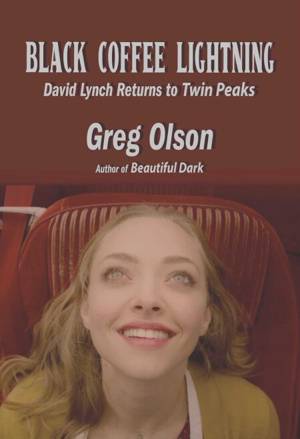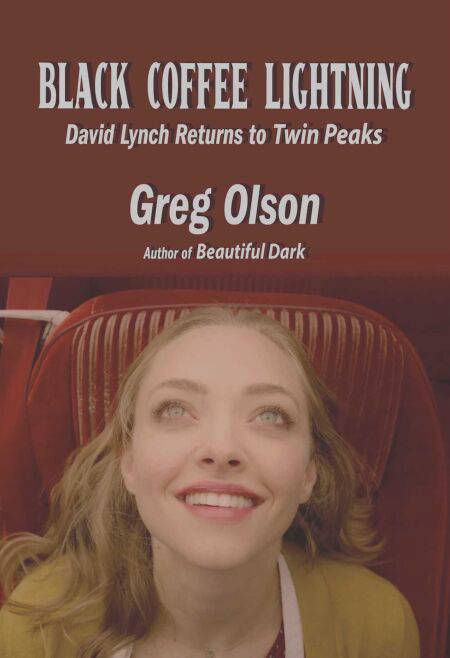
- Retrait gratuit dans votre magasin Club
- 7.000.000 titres dans notre catalogue
- Payer en toute sécurité
- Toujours un magasin près de chez vous
- Retrait gratuit dans votre magasin Club
- 7.000.0000 titres dans notre catalogue
- Payer en toute sécurité
- Toujours un magasin près de chez vous
11,17 €
+ 11 points
Format
Description
Greg Olson (author of David Lynch: Beautiful Dark and former film curator at the Seattle Art Museum) deconstructs Twin Peaks's widely acclaimed return to TV in 2017 through a unique lens encompassing William Blake, Walt Whitman, Jean Cocteau, Philip K. Dick, the color pink, the Bible, Vedic literature, and Marvel superheroes.
David Lynch is an international icon of visionary artistic innovation, humanistic thought and philanthropy, and spiritual exploration, and Twin Peaks: The Return is his magnum opus, a mythopoetic summation of his deepest beliefs and concerns. In Black Coffee Lightning: David Lynch Returns to Twin Peaks, Greg Olson (David Lynch: Beautiful Dark), in his characteristically intimate and personal way, traces the Twin Peaks currents of Lynch’s emotional-visceral storytelling, themes, imagery, and sound: the way the artist and viewer share an electrified circuit of mystery and understanding. Olson details Lynch’s kinship with transcendence-seeking artists like William Blake, Walt Whitman, Jean Cocteau, Philip K. Dick, and the post-World War II mystical Northwest painters. Small-town values, coffee culture, the color pink, the Bible, Vedic literature, Marvel Comics superheroes, and a Parisian camera crew wanting Olson to guide them through Twin Peaks territory all make appearances.
Over a thirty-year span, Lynch and Mark Frost created forty-eight hours of Twin Peaks TV and film, hypnotic cinematic music immersed in the depths and divine heights of human nature, a soulful song of the forest, America, the world, the cosmos. Olson, Lynch, and Twin Peaks have been on parallel tracks for decades. Olson’s longtime love, Linda Bowers, died shortly before Twin Peaks: The Return aired, and his lived experience with Lynch’s art speaks to the healing power of artistic engagement. Here his chronicle includes personal interaction with Lynch and Frost and their colleagues, as well as Olson’s perception of Lynch's inner world of karmic balancing, reincarnation, spiritual evolution, and veneration of women.
David Lynch is an international icon of visionary artistic innovation, humanistic thought and philanthropy, and spiritual exploration, and Twin Peaks: The Return is his magnum opus, a mythopoetic summation of his deepest beliefs and concerns. In Black Coffee Lightning: David Lynch Returns to Twin Peaks, Greg Olson (David Lynch: Beautiful Dark), in his characteristically intimate and personal way, traces the Twin Peaks currents of Lynch’s emotional-visceral storytelling, themes, imagery, and sound: the way the artist and viewer share an electrified circuit of mystery and understanding. Olson details Lynch’s kinship with transcendence-seeking artists like William Blake, Walt Whitman, Jean Cocteau, Philip K. Dick, and the post-World War II mystical Northwest painters. Small-town values, coffee culture, the color pink, the Bible, Vedic literature, Marvel Comics superheroes, and a Parisian camera crew wanting Olson to guide them through Twin Peaks territory all make appearances.
Over a thirty-year span, Lynch and Mark Frost created forty-eight hours of Twin Peaks TV and film, hypnotic cinematic music immersed in the depths and divine heights of human nature, a soulful song of the forest, America, the world, the cosmos. Olson, Lynch, and Twin Peaks have been on parallel tracks for decades. Olson’s longtime love, Linda Bowers, died shortly before Twin Peaks: The Return aired, and his lived experience with Lynch’s art speaks to the healing power of artistic engagement. Here his chronicle includes personal interaction with Lynch and Frost and their colleagues, as well as Olson’s perception of Lynch's inner world of karmic balancing, reincarnation, spiritual evolution, and veneration of women.
Spécifications
Parties prenantes
- Auteur(s) :
- Editeur:
Contenu
- Nombre de pages :
- 266
- Langue:
- Anglais
Caractéristiques
- EAN:
- 9781949024630
- Date de parution :
- 07-11-23
- Format:
- Ebook
- Protection digitale:
- Adobe DRM
- Format numérique:
- ePub

Les avis
Nous publions uniquement les avis qui respectent les conditions requises. Consultez nos conditions pour les avis.






